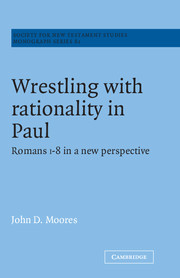Book contents
- Frontmatter
- Contents
- Acknowledgements
- List of abbreviations
- Introduction: The layout of this study and the approach behind it
- 1 Enthymematic semiosis in Paul
- 2 Varieties of enthymematic effect in Romans 1–4
- 3 Ways in which enthymemes arise in Romans 5–7
- 4 How enthymematic argument stands in Romans 8
- 5 Knowing what tune Paul is playing
- Conclusions reached their scope assessed
- Notes
- Bibliography
- Index of names
- Index of technical terms
Introduction: The layout of this study and the approach behind it
Published online by Cambridge University Press: 08 October 2009
- Frontmatter
- Contents
- Acknowledgements
- List of abbreviations
- Introduction: The layout of this study and the approach behind it
- 1 Enthymematic semiosis in Paul
- 2 Varieties of enthymematic effect in Romans 1–4
- 3 Ways in which enthymemes arise in Romans 5–7
- 4 How enthymematic argument stands in Romans 8
- 5 Knowing what tune Paul is playing
- Conclusions reached their scope assessed
- Notes
- Bibliography
- Index of names
- Index of technical terms
Summary
For Paul the truth of the gospel of Christ was not to be understood by dodging the logical riddles with which it confronts us. He does not speak as if the illumination guaranteed by the Holy Spirit dispenses with the need for reflection. Rather he speaks as if, sharpened and directed by the Holy Spirit, the human capacity for exercising critical judgement plays a formative role in our grasp of the gospel. In addressing those who, in different ways according to their differing backgrounds, had to face the difficulties such a perspective entails, Paul, impelled by the urgency of his message, was unaccommodating.
‘The attempt to understand the logic and argumentation of Paul must give a Greek a headache,’ V. Grönbech once observed (in Paulus Jesu Christi Apostel). And certainly to the mind shaped by the Socratic tradition, his manner of reasoning could scarcely fail to occasion perplexity of reader response. It was not his aim to stimulate detached intellectual enquiry in anything like the Socratic spirit. He assumes in his readers a core of conviction in which an answer to every question lies latent. And yet, if his approach is thus out of line with the Greek tradition, it is no less out of line with the OT tradition. In his concern with explanation, verification, substantiation, though it may be questionable how much there is of the Greek philosopher, there is certainly much of the Greek rhetorician with his philosophical background.
- Type
- Chapter
- Information
- Wrestling with Rationality in PaulRomans 1-8 in a New Perspective, pp. 1 - 4Publisher: Cambridge University PressPrint publication year: 1995



